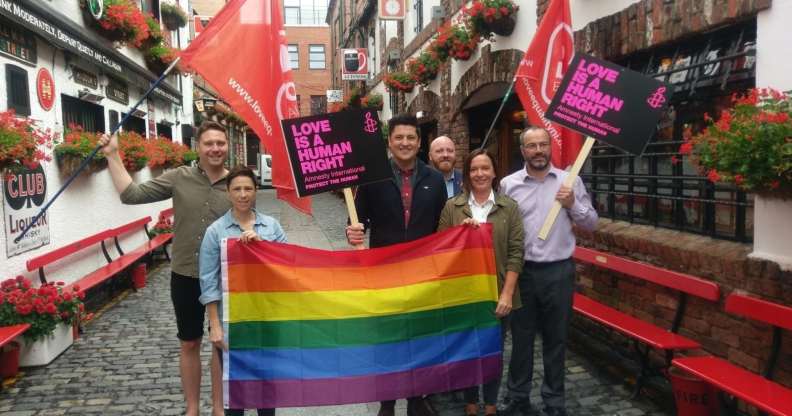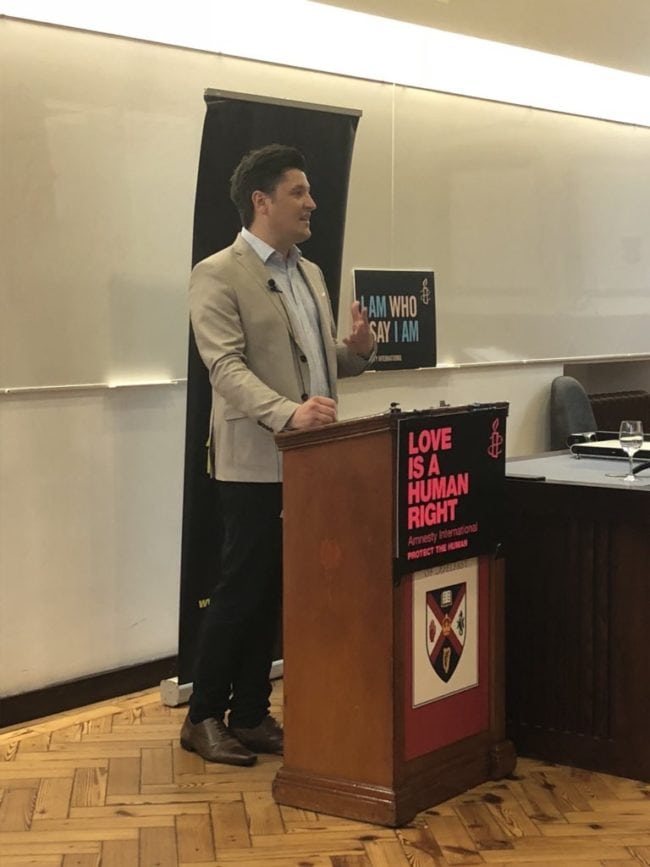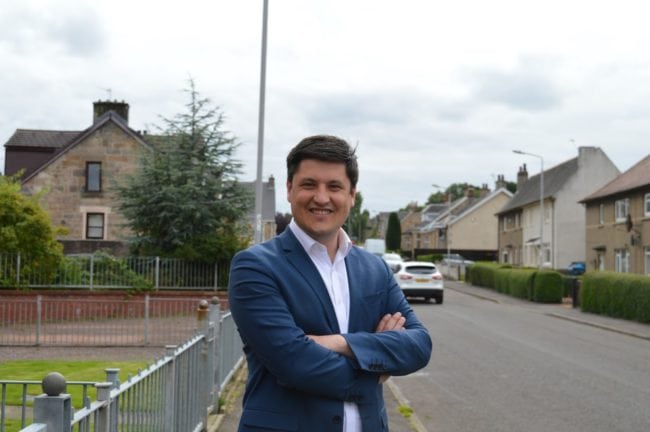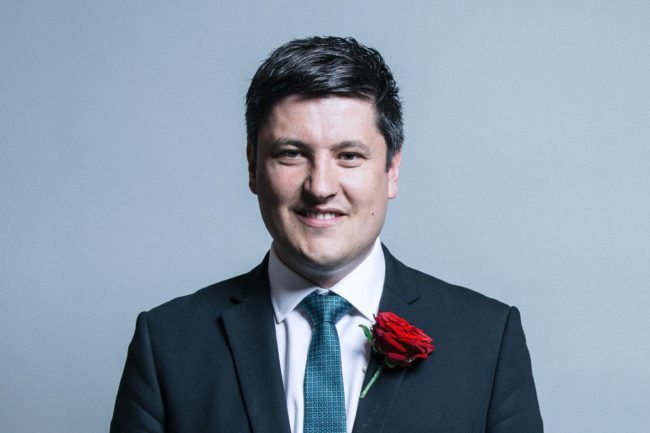Ged Killen MP: We must end ‘stitch-up’ blocking equal marriage in Northern Ireland

Labour MP Ged Killen has vowed to continue pushing for Northern Irish marriage equality, delivering Amnesty International’s annual Pride Lecture.
The Scottish MP addressed the annual event at Queen’s University Belfast on Thursday evening, as part of the city’s week-long Pride festival.

Ged Killen MP
In his address, Killen vowed to “force the Government to change its mind” on the issue, having stood in the way of progress on equality.
Killen declared that “the opponents of same-sex marriage in Northern Ireland have lost – they would lose a vote in a referendum, they would lose a vote in the Assembly and they would lose a vote in Parliament”.
“Instead of facing a vote, they now run away,” he continued. “It can only be described as one thing, a stitch-up to prevent people from claiming their rights.”
Here is the speech in full:
My name is Ged Killen and I am gay.
If that sounded like a confession, it wasn’t supposed to, but it’s a difficult habit to shake.
It’s easier now to say it than it used to be, but I have lost count of the number of times I’ve had to “come out”. I have lost count of the number of times that my sexuality has had to be considered or addressed.
Every time you start a new job; every time you make a new friend; every time you want to take your partners hand, but you wonder: is it safe? Every time you book a holiday, open a joint bank account, order a celebration cake. Every time you hear, “and what about Mrs Killen?”. Every time you meet an older relative who just wouldn’t understand.
Of course, there are notable exceptions.
My best friend Lisa, who I went all the way through school with, was asked one day by her 92-year-old grandmother from Donegal, “what about you and Ged, Lisa? He seems like a wile nice fella”.
To which Lisa said, “granny, Ged is gay. He likes men”.
She stopped, and thought about that for a minute or two, and then she said, “do you think he’d come and have a look at my curtains?”
And Lisa said, “granny, why would you want him to come and look at your curtains?”.
She said, “Lisa, everybody knows gay men know all about soft furnishings.”
Sadly, it’s just not that straight forward for everyone. In our family, we also have the older relative who just wouldn’t understand. And you go back in the closet to protect them.
My name is Ged Killen, and I am gay.

Ged Killen MP
It’s 2018, so why do I still have to say it? I get asked that question a lot, especially by straight people. Why do we have to label it at all?
Well, we’d love it if we didn’t have to.
But despite the progress, this is still our lived experience, and there is still much more to do.
Because where I stand now, my marriage is not recognised, and, for the same reason, many of you are not allowed to get married.
But progress is being made. It was a couple of years ago that Ruth Davidson was here giving this lecture, and while she and I have very different political views, on the issue of same-sex marriage, we are as one.
I am strangely proud of the fact that the leader of the Conservative party in Scotland is, as she said in her own words, a proud political party leader and a pregnant lesbian.
It shows that we have come a long way, and, as a young man I would never have believed it possible.
When I was younger, I can vividly remember looking at the world and thinking that there were certain things that could never apply to me. That I would never have a family of my own; that I wasn’t manly enough to have a trade like a plumber or a joiner; that I could never be the Prime Minister standing outside number 10 waving for the television cameras with my wife by my side.
Well, I’m not the Prime Minister, but I am an MP; and I’ve never been a plumber or a joiner, but at 21, I started my own construction company; and of course, I don’t have a wife, but I do have a husband, who was born right here in Northern Ireland.
So, it shows you what little I knew when I was younger.
Society has changed for the better, but we shouldn’t underestimate how changes in the law have driven those changes in attitude.
In my lifetime, we have seen off section 28; equalised the age of consent; ended the ban on LGBT people serving in the military; introduced civil partnerships; and in the rest of the UK and Ireland, legalised same-sex marriage.
Legislation has shaped public opinion, for better and for worse.
Take section 28. It was the first new homophobic law to be introduced in 100 years, it banned the “promotion” of homosexuality by local authorities in Britain. It came about because Margaret Thatcher believed “Children who need to be taught to respect traditional moral values are being taught that they have an inalienable right to be gay.”
In practice, it meant the only time LGBT people of my generation heard any reference to their sexuality or gender identity at school was often at the hands of the bullies who abused them.
Teachers were not allowed to talk about homosexuality, they were not trained to deal with LGBT+ bullying and we weren’t taught about sexual health and relationships.
People like me were invisible. We got on the school bus in the morning, put our heads down and hoped we didn’t get picked on.
Sometimes we did get picked on, sometimes we got horribly bullied, sometimes we got beat up.
We couldn’t tell our teachers, often we couldn’t tell our parents, we just had to hope that tomorrow would be better.

Ged Killen MP
Homophobic legislation makes the world a smaller and more dangerous place for LGBT+ people to live.
Of the 53 countries in the Commonwealth, homosexuality is criminalised in 37. Most of them are former British Colonies.
These are countries that owe their homophobic laws to the British empire. Homosexuality was criminalised in Northern Ireland by the British Parliament.
In its LGBT Action Plan, the UK Government states: “We believe LGBT people around the world deserve the same rights and respects we enjoy in the UK and that the UK has a special responsibility to address laws discriminating against LGBT people in the Commonwealth.”
What about the responsibility to LGBT people here in Northern Ireland? The LGBT Action Plan makes only passing reference to Northern Ireland.
But, discrimination is happening here, on the UK Government’s watch. How can we hope to defend and promote the rights of LGBT people globally when our Government refuses to do it for its own citizens?
A study by the Rainbow Project exploring the Emotional Health and Wellbeing of LGBT people in Northern Ireland found that 47% of respondents had considered suicide, 35% had self-harmed and 71% had suffered from depression.
That is the legacy of generations of inequality and discrimination based on sexuality and gender identity. What message do our politicians send when, even now, they continue to sanction that discrimination?
Because that is what is happening here in Northern Ireland.
State sanctioned discrimination on the basis of sexual orientation.
Imagine the message it would it send, if the politicians said you deserve to be treated as an equal. You deserve the right to marry the person you love?
We’ve got your back.
All of us desperately want to see a restored Assembly in Northern Ireland.
When you look at the experience of other countries around the world; when you look just down the road at the Republic of Ireland, you can see what a special moment the legalisation of same-sex marriage is.
How significant it is for LGBT people and their friends and families. It is a rare opportunity for a state to right generations of wrongs done to its people, it would be a real shame if MLAs in Stormont lost that opportunity.
But where Stormont cannot or will not act, the UK Government is obliged to do so.
And I truly believe, in time, opponents of same-sex marriage in Northern Ireland will come to a different view and may even regret not having introduced it themselves.
Just a few months ago, in a debate on the International Day Against Homophobia, Transphobia and Biphobia, Bob Stewart, a Conservative MP, stood in the House of Commons and said, “I voted against the equal marriage act, and I was wrong. I was wrong. I’ve seen the joy it’s given so many people, and I was wrong.” He went on to say that he now believed gay people should be able to marry in Church.
Now this debate is not about same-sex marriage in Churches, and I’m not proposing that Churches should be forced to conduct wedding ceremonies.
However, the role of the church and the view that marriage is intrinsically linked to a particular religious conception, cuts to the heart of one of the principle objections to marriage equality.
We had these same debates in Scotland and I know that many of the people making these arguments, did so from a place of sincerity and without recognising the harm that these views had.
It is not gay people who are responsible for redefining the institution of marriage.
Heterosexual people have been doing it for thousands of years. It wasn’t until the 17th century that people started marrying for love, rather than money or power.
It wasn’t until 1967 that interracial marriages were legalised across the United States.
Even in the Bible, it tells us that King Solomon had 700 wives!
So why can’t a lesbian from Newry have just one?
The definition and practice of marriage is historically contingent. Like many of our social institutions, it changes and adapts with the times, reflecting the society we are and the values we hold.
Objections to these changes represent this ongoing struggle of ideas and values.
That is why any argument against same-sex marriage is rooted in homophobia.
I am sure many of those opponents don’t intend to be homophobic, in many cases there is no intention to cause any hurt whatsoever, but their argument always relies on the fact that gay people are somehow less equal. That your status in society is lower and that because you are attracted to people of the same sex you cannot have recognition in the customs of our society.
That is, by definition, homophobia.
I was born and raised Catholic. In my church, divorce is forbidden; having children out of wedlock is forbidden; sex before marriage is forbidden.
But these laws aren’t on the statute book.
I respect, and will defend, the right of religious people to have their privately held views. But that is what they are, private.
Politicians do not get to cherry pick from the bible and then use their Christianity to justify discrimination against LGBT people. The public state should not institutionalise the privately held view of the few upon the many.
They believe that marriage is between a man and a woman. I don’t agree with them, but I accept their right to believe it and to live by it.
But why should anyone else have to live by it? If Arlene Foster is so opposed to the notion of two women marrying, my advice to her is: don’t marry a woman. It’s not compulsory.
The experiences our churches have had in Scotland is that those who were opposed, freely remain opposed. There is no gay lobby banging on the doors of their local chapels demanding they be allowed to marry at the altar. But many churches are now reaching out to make amends with the LGBT+ community. In some cases, churches that were opposed have now began conducting same-sex wedding ceremonies.
That could never have happened without the legislation.
Northern Ireland is now the only part of these Islands and Western Europe without same-sex marriage.
It’s 20 miles by boat across the Irish sea to get here from Stranraer. There are just 12 miles between Country Antrim and Campbeltown. I can board a plane in Glasgow, as I did yesterday, and land in Belfast barely half an hour later.
Our nations are so close together, that there are politicians who want to build a bridge between them. I wonder at what point crossing that bridge would my marriage no longer exist?
This is a place of shared British and Irish identity, and yet citizens here are denied the same basic rights as citizens in both Britain and Ireland.
It cannot go on like this. I believe that change is coming, it is a simply a matter of how, and when? Politicians only need to ask themselves, what side of history do I want to be on?
Opponents have said that it is not for Westminster to legislate for same-sex marriage because it is a devolved matter and doing so would be anti-democratic.
However, I believe, given the unique circumstances of same-sex marriage in Northern Ireland, Westminster has a moral and a democratic obligation to legislate.
The public supports it; support for same-sex marriage in Northern Ireland is repeatedly polled at over 70%.
The Assembly supports it. When it was up and running, MLAs voted in favour of same-sex marriage, only to be blocked by a petition of concern.
The British Parliament supports it. If put to a vote I am in no doubt that the vast majority of MPs would extend this right to Northern Ireland.
Under these circumstances, it is anti-democratic not to legislate for same-sex marriage.
This is a unique political impasse, with a very specific logjam that must be resolved.
History tells us often progress has been made for LGBT people in Northern Ireland when the UK Government has legislated.
The decriminalisation of male homosexual acts;
In 2001, the age of consent, equalised by a UK Act of Parliament.
The discriminatory offenses of “buggery” and “gross indecency” abolished in the Sexual Offences Act of 2003;
In 2005 we had Civil Partnerships, the first ceremonies took place right here in Belfast.
And In 2017, it was the UK’s Policing and Crime Act that enabled men convicted of decriminalised anti-homosexuality offences to obtain a pardon.
There is clear precedence for the UK Government legislating for LGBT+ rights in Northern Ireland and it must not be allowed to forget that in the name of political convenience.
This shouldn’t be a debate about devolution. This is about having a level playing field of civil rights across the whole of the UK. Surely, no matter whether we live in Armagh, Aberdeen or Aberystwyth, we should all have the same fundamental rights?
And what can be more fundamental than the right to marry the person you love?
This injustice is not lost on those of us who represent other parts of the United Kingdom. There is a growing uneasiness in Westminster. A realisation that the situation for LGBT people in Northern Ireland is grossly unfair. A gradual acceptance that intervention at a UK level is increasingly necessary.
It is already the official Labour party position. A UK Labour Government would legislate for marriage equality in Northern Ireland tomorrow.
And when I raise this issue in the House of Commons, I look across the floor and I don’t see opposition from the Government’s front bench, I see discomfort. I see shame.
Because they agree that same-sex marriage should be extended to Northern Ireland. They know they have the power to change it and they know the only reason they haven’t is because it will upset the 10 people from Northern Ireland who are keeping the Prime Minister in a job.
But they also know the situation is unsustainable. Because we are not letting this go. This is only going to end one way. With marriage equality.
So, we have started with two Private Member’s Bills working their way through the very complex web that is the UK Parliament.
In the House of Commons, we have Labour MP, Conor McGinn’s Marriage (Same Sex Couples) (Northern Ireland) Bill.
They tried to block its second reading (Christopher Chope objected), but it is coming back to the House of Commons in October.
At the same time, the Conservative Peer, Lord Hayward has brought forward a mirror image of the bill in the House of Lords. It had its first reading on March 28 and we await the second reading.
If passed, these bills would legislate for same-sex marriage in Northern Ireland.
There is also Conservative MP Tim Loughton’s Private Member’s Bill that would open up Civil Partnerships to opposite sex couples.
Conor McGinn recently tabled an amendment to the Bill that would extend to Northern Ireland, the requirement for an official report into how the law – in terms of civil partnerships and marriage – could be changed to achieve equality between same-sex couples and other couples.
This amendment wouldn’t legislate for same-sex marriage, but it would significantly increase pressure on the government to do so.
I won’t talk up the chances of these Bills succeeding on their own. I don’t want to give you false hope.
It is very difficult for an individual Member of Parliament to get a Private Member’s Bill through all of the necessary stages to become law.
But we are constantly on the lookout for these opportunities to agitate and increase pressure. We are not going to take no for an answer.
Another mechanism could be to amend a bill that is already progressing through Parliament.
This is difficult, because we don’t get to decide what bills go through, the Government does. But if we could force an amendment, it is perhaps the most sure-fire way to force a vote on same-sex marriage in Parliament.
However, ultimately, the Government is in control.
So, what we need is for the Government to either allow one of these bills to pass or bring forward its own bill.
What we need to do is force the Government to change its mind.
Because, what is clear, is that in both Houses there is majority, cross-party support for same-sex marriage in Northern Ireland.
The opponents have lost the fight in Parliament, they know they would lose a vote, so instead they are trying to deny MPs that vote, and, by extension, they are trying to silence voices of the 70% of people in Northern Ireland who support same-sex marriage.
The opponents have lost, so instead they trying to run away from the issue.
The Government managed to find £1 Billion to strike a deal with the DUP to stay in power. It must now ask itself if denying equal rights to LGBT+ citizens is a price worth paying.
The number of MPs and Lords who will do whatever it takes, is growing.
So, we will keep looking for the legislative options; we will keep raising it in debates; we will keep asking the parliamentary questions.
We will continue to apply whatever political pressure is necessary until they are fed up being harried by MPs of all colours; Karen Bradley will be sick of the sight of me in Northern Ireland question time.
We will pursue all avenues until we end this stitch up and get equality for LGBT people in Northern Ireland.
But politicians are only a small part of the picture, and before I conclude my remarks, I want to talk briefly about the other crucial element in this fight for equality. It’s all of you; it’s Pride; it’s protest.
Shamefully, when I was first beginning to understand my sexuality I used to say things like, “I’ll never be one of those flag-waving gays”, as though that were something to be proud of. As though, by diminishing my gayness, I would somehow make myself more acceptable, more tolerable.
So how have I ended up here? Well I’ve long since decided I don’t want to be diminished.
I know now what I couldn’t appreciate as a young, frightened gay man. That our rights have never been won by sitting quietly at home waiting for those in power to decide the time is right. That I owe my rights to the activists who came before me; that the fear they overcame and the hatred they faced down was so much greater than anything I could possibly imagine.
And just as that hatred knows no borders, neither must the LGBT+ movement. We must stand as one, right across the UK and Ireland, across the commonwealth, across the world.
It was a German civil servant named Karl Heinrich Ulrichs who was thought to be the first gay man to publicly speak out for gay rights in 1867; 150 years later, it was an Irishman, named Leo Varadkar who became the first openly gay Taoiseach, and the fourth openly gay head of government in modern times. It was Americans Del Martin and Phyllis Lyon who helped set up the first national lesbian organisation in the US in 1955 and who became the first people to marry when the California Supreme Court ruled same-sex marriage was legal in 2008.
Each of them stepping into the unknown, breaking down barriers for LGBT people they will never meet, at home and all around the world.
So, when LGBT+ people are being targeted by police using Grindr in Egypt; when Donald Trump bans transgender people from serving in the military, and when a school in England stops a teenage boy from performing his drag act in the talent show, we stand together and say, “enough is enough”.
So here I am in Northern Ireland. And enough is enough. This is personal. Your rights are my rights. An injury to one, is an injury all.
I will stand shoulder to shoulder with you in this fight, doing everything I can in Westminster. One of many, from across the UK who will do likewise.
So, whoever you are, wherever you live. Stand with us in solidarity. Demand change.
Whether at Stormont or Westminster, we will win this. All of us, together.
Ged Killen is the Member of Parliament for Rutherglen and Hamilton West

